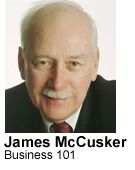 |
Published September 2003
Entrepreneurs
in position
to turn on a dime
 When
Microsoft announced that it was replacing its stock-option program, many
analysts believed that this was a sign that Microsoft had entered its
“mature” phase. Maybe, but in the words of Ira Gershwin, “It ain’t necessarily
so.”
When
Microsoft announced that it was replacing its stock-option program, many
analysts believed that this was a sign that Microsoft had entered its
“mature” phase. Maybe, but in the words of Ira Gershwin, “It ain’t necessarily
so.”
After the market bubble burst, the ensuing recession and listless recovery left Microsoft’s stock price considerably under its highs, and considerably under the price at which many options had been issued to its workers. Moreover, the outlook for the market and the company’s shares contained no exuberance of any sort. So the options just sat there, useless, with no value as an incentive for Microsoft’s workers.
A basic rule of good management is that an incentive system that doesn’t work quickly becomes a menace. A dysfunctional incentive has to be gotten rid of quickly before it begins to be an irritant, or a joke, because it will become a focal point of discontent and exert a gravitational attraction for every real or imaginary source of dissatisfaction in the work force.
So Microsoft wisely abandoned the stock-option program and substituted a stock-distribution program in which employees will receive actual shares — for these will have and retain value even if the stock price never goes up.
Was Microsoft’s action simply good management? Or was it recognition that it was experiencing a kind of corporate hair loss, girth accrual and enhanced propensity to grunt that signified its entry into corporate “middle age”?
It is hard to tell for sure, but the company still seems to be very much an entrepreneurial organization, and it retains the type of energy and immaturity that goes with it.
In fact, one of the very things cited by Wall Street analysts as evidence of the firm’s creeping maturity is really a classic example of what experienced management consultants call “entrepreneurial changeroni.” Anyone who has worked in or with an entrepreneurial business will recognize the plot immediately. See if this sounds familiar:
The CEO takes a business trip. While on the plane he, or she, reads a book (or a magazine article) and experiences a sort of epiphany. When he, or she, gets back home and returns to work, the organization is turned upside down and reshaped to accommodate whatever idea it was that seemed so compelling at 34,000 feet or during a six-hour Denver layover.
Some of these ideas are good. Some, unfortunately, are best left on the airplane. Magazines, in particular, publish some truly crackpot ideas sometimes.
But the enforced idleness of air travel gives a CEO the unusual luxury of time to contemplate his or her company and dream of ways to make it better. And, being action-oriented, they often seize upon a solution when a publication offers it up.
Of course, what makes entrepreneurs different from the rest of us is that they have both the energy and the power to implement a new idea, even if it is something as inherently silly as interviewing all employees to find out which ones “think of themselves as lucky.” (One entrepreneur, having read in a magazine that this would identify those with leadership ability, insisted upon doing just that. If the in-flight movie had been “Dirty Harry,” perhaps he would have felt differently.)
Returning home on a flight from Europe in 2001, Microsoft’s chief executive officer, Steve Ballmer, read a book by General Electric’s former top guy, Jack Welch. Ballmer believed that Welch’s kind of financial management structure was just what Microsoft needed. And when he arrived back in Redmond he began immediately to reshape the firm along the lines of Welch’s General Electric.
What followed was a reorganization into seven business units and, most significantly, the placement of a chief financial officer into each one. This, presumably, will cure the “apples and oranges” problem of comparing the performance of widely diverse parts of the software giant — by standardizing reporting into the kinds of financial data that CFOs know and love.
Will the reorganization work? Yes. Will Microsoft like it when it works? Probably not.
The change is a major philosophical shift for the company, which has always been driven by product and market development while financial management ran a distant second.
There is a distinct risk that the installation of a cadre of CFOs could very well achieve standardization at the expense of innovation, motivation, energy and effectiveness — in the same way the installation of political officers would affect a military organization.
But whether the reorganization makes Microsoft more effective or not, clearly the firm has not yet lost all of its entrepreneurial character. It is still a reflection of its CEO, with all of the good and bad that comes with that. And if you know and love entrepreneurial businesses, that is a good thing.
James McCusker, a Bothell economist, educator and small-business consultant, writes “Your Business” in The Herald each Sunday. He can be reached by sending e-mail to otisrep@aol.com.
The
Marketplace
Heraldnet
The
Enterprise
Traffic
Update
Government/Biz Groups
© The Daily Herald Co., Everett, WA
